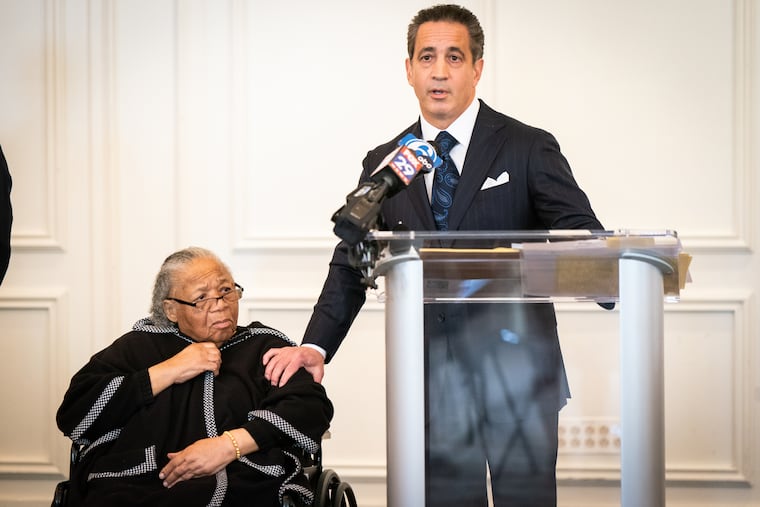Prosecutors, cops withheld key evidence against a Black teen executed for a 1931 murder he didn’t commit, lawsuit says
Alexander McClay Williams was made a "racial scapegoat" in the death of a matron at the Glen Mills School for Boys, according to attorney Joseph Marrone.

The family of a Black teen who was executed decades ago for a murder prosecutors now say he did not commit has filed a federal lawsuit, saying Delaware County authorities coerced him to falsely confess and conspired to hide key evidence from a jury.
Alexander McClay Williams was 16 when he was convicted and sentenced to death in the stabbing death of a white woman who worked as matron at the Glen Mills School for Boys in Delaware County. An all-white jury took just three hours to convict him of killing 33-year-old Vida Robare, even though there were no witnesses to the crime and no forensic evidence linked him to her death.
Five months later, Williams was executed, becoming the youngest person in Pennsylvania history to be put to death.
Joseph Marrone, the attorney who filed the suit on behalf of Williams’ sister, Susie Carter, said in an interview Monday that Williams’ case deserves national attention for the injustice it represents. Williams’ family, he added, is eager to hold the county accountable for that wrongdoing.
“As egregious it is of what went on in Alexander’s case — a classic coerced confession, someone who didn’t have his parents or an attorney with him at the time — those issues are still a big part of what goes on today in Philadelphia,” Marrone said, drawing comparison to his former client Walter Ogrod, who spent 28 years in prison for the 1988 slaying of 4-year-old Barbara Jean Horn before he was exonerated for similar reasons.
Marrone’s lawsuit contends that Williams’ Fourth and 15th Amendment rights were violated by then-Delaware County Detective Michael Trestrall, who ignored Williams’ initial statement that he had nothing to do with Robare’s death and interrogated him six or seven times without a lawyer or parent present.
The suit also names then-Delaware County Assistant District Attorney Louis A. Bloom, who Marrone said ignored important exculpatory evidence, including a large, adult-sized bloody handprint at the scene of Robare’s murder. Bloom also overlooked Robare’s long documented history of abuse by her husband, the last person to see her alive and the first to discover her body, according to the lawsuit.
“The detectives and district attorney were so eager to reach a successful resolution, they snatched Alexander out of nowhere and made him a racial scapegoat,” Marrone said. “A lawsuit like this continues to educate the public and make changes in the justice system so it doesn’t happen again.”
Bloom and Trestrall are dead. Attorneys representing their estates did not return requests for comment Monday.
For the last 30 years, Samuel Lemon, the great-grandson of William Ridley, the first Black lawyer admitted to the Delaware County Bar Association and Williams’ trial attorney, has set out to prove that the teen was innocent.
Lemon’s efforts led District Attorney Jack Stollsteimer to reopen Williams’ case in 2022. Stollsteimer called the decades-old prosecution a “subversions of due-process rights.”
A county judge then overturned the conviction in the same courtroom where Williams was sentenced to death, and the teen was posthumously exonerated months later by an order from then-Gov. Tom Wolf.
But Carter, Williams’ sole surviving sibling, said Monday that her family’s search for justice is far from over.
“What would you do if it was your family member who was murdered because his skin was Black?” Carter, 94, said. “I‘m sure you would want justice too. And you wouldn’t want it to happen again to anyone else.”
Robare had been stabbed 47 times with an ice pick, which Lemon has long contended shows her murder was a crime of passion. At the time of her killing, Williams was elsewhere on the Glen Mills property with a work crew, taking a 20-minute break to recover shovels from a nearby shed.
The teen would have to have acted with supernatural speed to kill Robare within that window of time, Lemon said.
He said Williams was targeted because of the color of his skin and his troubled childhood. By 16, he had set a fire that destroyed a barn and caused $25,000 in damage and burglarized a post office. A county judge had sentenced him to an indeterminate stay at the Glen Mills school.
His conviction and execution for a crime he did not commit was an outrage, Lemon said. And it has scarred his entire family.
“I’m seeing this as an opportunity for restorative justice, though it certainly can’t bring back Alexander,” Lemon said. “But not only did he suffer the ultimate punishment, every member of his family was punished over nine decades. That judge’s decision went a long, long way.”